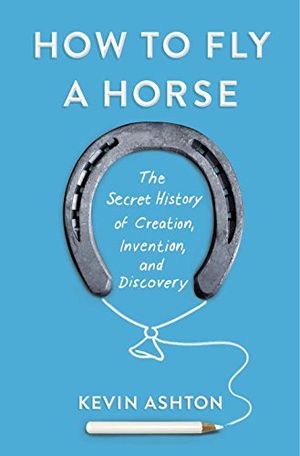Kevin Ashton Describes “the Internet of Things”
The innovator weighs in on what human life will be like a century from now
/https://tf-cmsv2-smithsonianmag-media.s3.amazonaws.com/filer/d7/c1/d7c10413-4c00-44b3-b292-801fc1150297/kevin-ashton.jpg)
Kevin Ashton is an innovator and consumer sensor expert who coined the phrase “the Internet of Things” to describe the network connecting objects in the physical world to the Internet. He has a new book, How to Fly a Horse: The Secret History of Creation, Invention, and Discovery, out January 20. We spoke to him by email about epiphanies, undervalued inventors, alien life, and more.
You coined the term "the Internet of Things" in 1999, but it can still seem an odd concept. How would you describe it?
In the twentieth century, computers were brains without senses—they only knew what we told them. That was a huge limitation: there is many billion times more information in the world than people could possibly type in through a keyboard or scan with a barcode. In the twenty-first century, because of the Internet of Things, computers can sense things for themselves. It’s only been a few years, but we already take networked sensors for granted. One example is GPS-based location sensing. Civilian GPS was first authorized by congress in 2000, and the GPS systems in cellphones were not tested until 2004. Yet it’s already hard to imagine a world without GPS: it helps us find our way around. In the imminent future, it will enable things like self-driving cars, which will give us back the 20 days a year we spend doing nothing but driving, will save 40,000 lives a year in the U.S. alone, will reduce traffic and pollution, and will allow cities to grow without devoting as much land to roads.
What are the most important skills an innovator can have?
Tenacity is far more important than talent. Innovators don’t do things that have never been tried; they do things that have never been done. The difference between successful innovators and everybody else is that innovators keep failing until they don’t. They have to be irrationally passionate. Innovators keep banging their head against the wall until they make a door.
Do you believe in "eureka moments”—epiphanies or moments of brilliant insight and inspiration?
There is plenty of evidence that “eureka moments” are imagined and apocryphal. I suspect that what some people perceive as moments of epiphany are just the statistically inevitable few occasions when something creative comes quickly. Imagine trying to shoot a basketball from the far baseline. If you throw it enough times, it will go in once in a while. Is that a moment of epiphany? No: the ball has to go somewhere. But creating is a series of thoughtful steps, not one hopeful lob. In my experience, the most productive people have the least belief in inspiration. That’s not a coincidence. They don’t wait for magic. They work.
Who's the most underappreciated inventor in history?
History overrates the role of individuals, especially individuals with power. As a result, history’s most underappreciated inventors are women, especially non-white women; and its most overrated inventors are men, especially white men. One example—there are many—Marietta Blau, a Jewish woman, made major advances in particle physics, while Cecil Powell, a British man, received the Nobel Prize for “adopting” her work.
Do you think that romanticizing creativity is a modern tendency?
Almost all the myths about creating as a kind of magic practiced only by genetically “gifted” wizards are products of the prejudices of the late nineteenth and early twentieth century. For most of history, creation was seen as a consequence of common people doing ordinary work, and all the glory went to kings and gods; creators were not even memorialized, let alone romanticized.
How do you think human society will be different in 100 years?
We will have almost certainly discovered life elsewhere in the universe, not just in one place but in many. The discovery will have a big impact on human society. Today, we act as if Earth is the purpose of the universe, and human beings are the purpose of the Earth, and that “intelligent life” only means “tool-improving life,” and we are at the pinnacle of evolution. One hundred years from now we will have discovered that life is abundant and that the evolutionary niche we occupy, which is the “creative niche,” is perilous, in part because of unintended consequences like climate change, and that it’s just one way life survives, and not necessarily the “best.” The social impacts are hard to predict, and will unfold over more generations than we will produce in the next 100 years, but the strong trend will be toward more equality and peace within our species and more humility both with respect to other species and to our place in the universe. I know it’s not fashionable, but I am excited and optimistic. Our future shines bright.

How to Fly a Horse: The Secret History of Creation, Invention, and Discovery